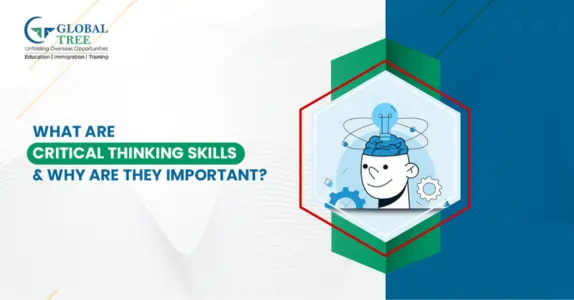What is Critical Thinking and Why its Important?

What is Critical Thinking?
In today's complex and rapidly changing world, critical thinking skills are more important than ever. These skills enable individuals to analyse information, evaluate evidence, and make well-informed decisions.
Whether in personal life, education, or the workplace, critical thinking skills are essential for problem-solving and achieving success. This article explores what critical thinking skills are, their components, and why they are crucial in various aspects of life.
Understanding Critical Thinking Skills
Critical thinking skills involve the ability to think clearly and rationally, understanding the logical connection between ideas. It encompasses several key components, including analysis, evaluation, inference, explanation, and self-regulation. These skills enable individuals to process information deeply and come to well-reasoned conclusions
[Suggested Read: How to develop Emotional Intelligence?]
Key Components of Critical Thinking
1.Analysis:
The ability to break down complex information into smaller, more manageable parts to understand it better. This involves identifying relationships, patterns, and connections between ideas.
2.Evaluation:
Assessing the credibility and validity of information, arguments, and evidence. This requires discerning between strong and weak arguments and recognizing biases or assumptions.
3.Inference:
Drawing conclusions based on evidence and reasoning. This involves making logical deductions and predictions from the available information.
[Discover: How journaling can help you in hard times?]
4.Explanation:
Clearly and concisely communicating your reasoning and the results of your analysis. This includes presenting arguments logically and coherently.
5.Self-Regulation:
Reflecting on your own thought processes, recognizing cognitive biases, and adjusting your approach as needed. This involves being aware of your thinking patterns and seeking continuous improvement.
[Suggested Read: How to Rock Your Self-Introduction in an Interview?]
Why Are Critical Thinking Skills Important?
Critical thinking skills are vital for several reasons, impacting various areas of life from education to professional settings and beyond.
1. Improved Decision-Making
Critical thinking enables individuals to make better decisions by evaluating information thoroughly and considering multiple perspectives. This leads to more informed and effective choices, reducing the likelihood of mistakes and negative outcomes.
Example: In the workplace, a manager who uses critical thinking will assess all available data before making strategic decisions, ensuring that their choices are based on solid evidence rather than assumptions.
2. Enhanced Problem-Solving
Critical thinking skills are essential for effective problem-solving. By analysing problems systematically and evaluating possible solutions, individuals can develop innovative and efficient ways to address challenges.
Example: Engineers and scientists rely on critical thinking to develop solutions to technical problems, ensuring that their approaches are both practical and effective.
3. Better Communication
Critical thinking enhances communication skills by promoting clear and logical expression of ideas. This ensures that arguments are well-structured and persuasive, facilitating better understanding and collaboration.
Example: In a debate or discussion, someone with strong critical thinking skills can present their arguments clearly and respond effectively to counterarguments, leading to more productive conversations.
4. Increased Creativity
While critical thinking is often associated with logic and analysis, it also fosters creativity. By challenging existing assumptions and exploring alternative viewpoints, critical thinkers can generate novel ideas and solutions which can help in developing creative thinking.
Example: Artists and designers use critical thinking to push the boundaries of their creativity, exploring new techniques and perspectives to enhance their work.
5. Greater Independence
Critical thinking promotes intellectual independence by encouraging individuals to think for themselves rather than accepting information at face value. This leads to more autonomous and confident decision-making.
Example: Students who develop critical thinking skills are better equipped to evaluate the validity of information they encounter, making them more independent learners and thinkers.
6. Resilience to Manipulation
In an age of information overload and misinformation, critical thinking is crucial for discerning truth from falsehood. Critical thinkers are less susceptible to manipulation and more capable of recognizing biases and propaganda.
Example: In the media landscape, critical thinking helps individuals evaluate news sources and distinguish between credible journalism and misleading information.
[Learn: How to Develop your Personality with simple Tips]
How to Develop Critical Thinking Skills? 6 Simple Tips
Critical thinking skills can be cultivated through deliberate practice and a commitment to intellectual growth. Here are some strategies to enhance these skills:
1. Ask Questions
Curiosity drives critical thinking. Ask questions to deepen your understanding and challenge existing assumptions. Questions like "Why?", "How?", and "What if?" can open up new avenues of thought.
2. Reflect on Your Thinking
Take time to reflect on your thought processes. Identify any biases or assumptions that may influence your thinking and strive to approach problems with an open mind.
[Suggested Read: Simple Stress Management Tips for Students]
3. Engage in Active Learning
Participate actively in learning experiences rather than passively consuming information. Engage in discussions, debates, and problem-solving activities to practise and refine your critical thinking skills.
4. Seek Diverse Perspectives
Expose yourself to different viewpoints and consider alternative perspectives. This broadens your understanding and helps you evaluate information more thoroughly.
5. Practice Analytical Writing
Writing analytically forces you to organise your thoughts and present arguments logically. Practice writing essays, reports, or analyses to enhance your ability to think critically and communicate effectively.
[Check Out: Simple Tricks to improve Writing Skills in English]
6. Use Critical Thinking Frameworks
Employ frameworks and models that facilitate critical thinking, such as SWOT analysis (Strengths, Weaknesses, Opportunities, Threats) or the Socratic method. These tools provide structured approaches to analysing and evaluating information.
Conclusion
Critical thinking skills are essential for navigating the complexities of modern life. They enable individuals to make better decisions, solve problems effectively, communicate clearly, foster creativity, and maintain intellectual independence.
By deliberately cultivating these skills through questioning, reflection, active learning, seeking diverse perspectives, analytical writing, and using critical thinking frameworks, individuals can enhance their ability to think critically and achieve greater success in both personal and professional contexts.
In an increasingly interconnected and information-rich world, critical thinking remains a crucial tool for understanding, evaluating, and engaging with the world around us.
[Suggested Read: What is Sustainability and How it helps for Working professionals?]


